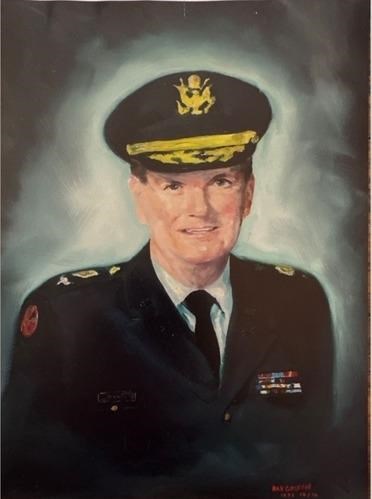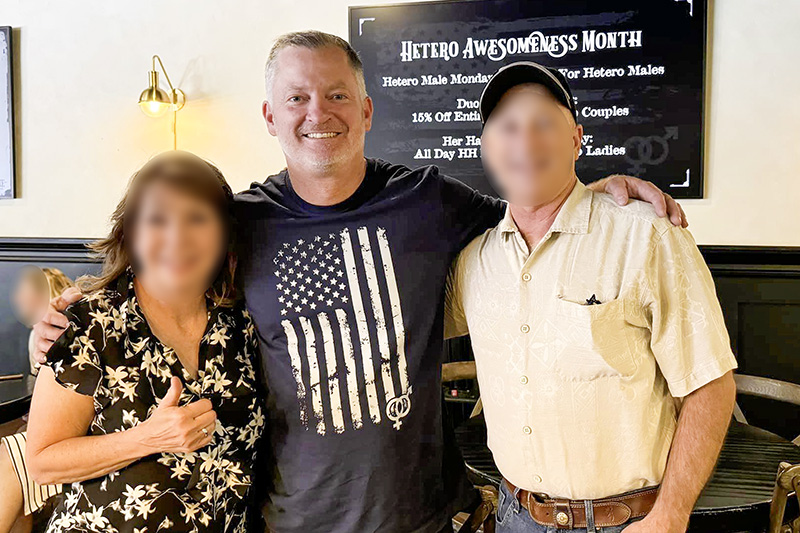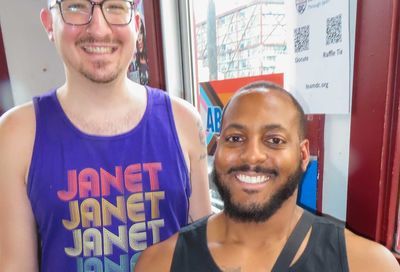‘Serving in Secret’ Delves into the History of Gays in the Military
'Serving in Secret' uses a retired gay Marine's love story to examine the history of LGBTQ people in the Armed Services.

“I think it’s important to tell this story now, for obvious reasons, because of the moment that we’re all having culturally, but also just to create a history, a record for everyone, not just for LGBTQ people,” says Jonathan Baker, the executive producer and director of Serving in Secret.
The documentary, a co-production of MSNBC Films and TIME Studios, is one of several films in Trevor Noah’s documentary series “The Turning Point,” a collection that examines hot-button issues in the United States. Serving in Secret focuses on the historical prohibitions put in place to prevent gay, lesbian, and bisexual individuals from serving in the U.S. military.
For Baker, the connection to the ban on open military service is personal, with his biological uncle, Tom Carpenter, a San Diego-based retired U.S. Marine, serving as the viewer’s introduction to the larger topic.
Carpenter, now 75, was forced to conceal his relationship with his now-deceased longtime partner, Naval flight officer Courtland Hirschi, at a time when homosexuality was not only prohibited in the military ranks but criminalized under many state laws.
Using Carpenter and Hirschi’s clandestine relationship as the jumping-off point, Baker examines the historical context of gay men in the Armed Services, the fear they had of being outed and forcibly discharged from the military, the so-called “compromise” that led to the adoption of the now-defunct “Don’t Ask, Don’t Tell” policy of the 1990s and early 2000s, and the eventual repeal of that policy, which Carpenter later advocated for after retiring from the Marines.
“When Uncle Tom finished [working on] repeal, I kept saying, ‘You’ve got to write your memoir because people need to hear this story,’ Baker says. “I thought it was very inspirational. I kept badgering him for years.
“And then something happened where he was at one of the military parties or mixers down in San Diego, and he was running into some younger service members who were out and happily serving. He was introduced as one of the guys responsible for the repeal of ‘Don’t Ask, Don’t Tell,’ and the guys were like, ‘So what was that all about?'”

The film cuts between the central love story and interviews with veteran LGBTQ activists, media personalities, retired military brass, and politicians like Nancy Pelosi and Pete Buttigieg, all seeking to put the issue of open military into a broader historical and cultural context.
“When I started to pitch the story, I felt like Tom is especially inspirational, because he was able to convert the trauma and the discrimination of his own experience into advocacy work,” says Baker. “I thought that from the film standpoint, having a core hero character to focus on and get to know personally would help contextualize the issues and bring them into real dimension when you see Tom’s personal side of it.
“When TIME Studios and MSNBC responded to the pitch, it was a balancing act,” he continues. “I think TIME was especially interested in the personal family story — I think they loved the emotional side of that, the love story. And MSNBC was really advocating for the [larger historical story]. So it was a really interesting and good collaboration among the core production companies involved.”
Baker recognizes the limitations of his film, as his uncle’s story may not resonate with all audiences.
“This story is so multidimensional,” he says. “There’s so much that’s not in the documentary. It’s like fitting a swimming pool into a teacup. So many people that we talked to didn’t make the final edit of the movie.
“When you think about Tom and Court’s experience, there are so many other stories that are so different, whether you’re talking about women in the military, meaning lesbians or even straight women who were accused of being gay because they wouldn’t put out. There are lots of different complexities to each and every one of the stories…. It is not a one-size-fits-all story.”
For Baker, the film serves as a primer on the larger topic of gays in the military, introducing the topic in an easy-to-understand way for viewers who may not be well-versed in the politics surrounding the issue.
“This is really just about making sure to highlight the advocates’ and the heroes’ journey, and the sacrifices that were made historically, and really educate people on what it was really all about,” he says. “My hope, my aspiration for the piece is that it can be a way for people to communicate and understand about these really divisive issues with a bit more empathy.”
Baker also hopes to equip viewers with a historical perspective and a broader understanding of LGBTQ issues that will allow them to identify and recognize parallels between the fight over military service and modern-day issues, such as the recent deluge of anti-transgender legislation being pushed at the state and federal levels.
“I think the whole notion of this is like, ‘Why now? Why do we want to revisit this story now?’ The answer is because the same old tropes are back again, the same stereotypical bullshit. Here it comes again: fear, ignorance, stereotypes,” he says. “What this is really about is trying to give people tools to have an intelligent, honest conversation about what’s happening today so that we don’t backslide.”
Serving in Secret is currently streaming on Peacock. Visit www.peacocktv.com.
Support Metro Weekly’s Journalism
These are challenging times for news organizations. And yet it’s crucial we stay active and provide vital resources and information to both our local readers and the world. So won’t you please take a moment and consider supporting Metro Weekly with a membership? For as little as $5 a month, you can help ensure Metro Weekly magazine and MetroWeekly.com remain free, viable resources as we provide the best, most diverse, culturally-resonant LGBTQ coverage in both the D.C. region and around the world. Memberships come with exclusive perks and discounts, your own personal digital delivery of each week’s magazine (and an archive), access to our Member's Lounge when it launches this fall, and exclusive members-only items like Metro Weekly Membership Mugs and Tote Bags! Check out all our membership levels here and please join us today!



























You must be logged in to post a comment.